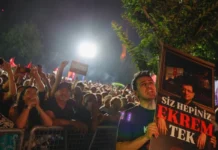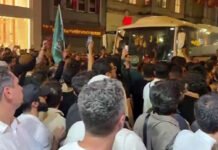Turkey’s Ministry of Justice asked the Keskin chief public prosecutor to take a series of measures to isolate and closely monitor the communications of former high court judges who were removed from their jobs and imprisoned on terror charges in the aftermath of a 2016 coup attempt, a letter classified as “secret” has revealed.
The letter, dated October 2016, asks the Keskin Chief Public Prosecutor’s Office to prevent former judges from congregating with other prisoners and to request transfer of other inmates in event of overcrowding to ensure that the judges remain isolated. The ministry also requested a floor plan showing exactly where each inmate was staying, including the cell numbers, and said special attention needed to be paid when cell reallocation was necessary.
The letter was shared by Nalan Dilara Uğur, daughter of former Supreme Court of Appeals judge Hüsamettin Uğur, from her Twitter account. Uğur was kept in solitary confinement in Keskin Prison for four years and was recently transferred to another prison after a series of allegations by his family that he was being beaten and threatened by prison guards. According to his daughter, it took a year before his request for transfer was finally granted.
Bu gizli ibareli belge Keskin C. Başsavcılığına gönderilen ve babamların hücrede tutulmasını isteyen bir belge. İletişimlerimizin dahi “özel olarak” incelenmesi talep edilmiş. Tahsis ettiğiniz lojmanda oturuyorduk gözaltına aldığınızda, bu kadar tehlikeliysek neden? pic.twitter.com/lmNZWQj5lF
— Nalan Dilara Uğur (@nalandilora) February 12, 2021
The ministry also instructed the chief public prosecutor to take other “special” measures for the former judges including the appointment of “special personnel” to monitor the cells of judges on a 24-hour basis, restricting guards’ entry into cells absent permission from the warden and special monitoring of private communications including phone calls and letters. Any information obtained from private communications considered to be important needed to be communicated to the prosecutor in charge of the case in question, the letter said.
Hüsamettin Uğur was summarily dismissed from his position as a judge following the coup attempt in Turkey on July 15, 2016. He was sentenced to 10 years, six months’ imprisonment for membership in a terrorist organization. He is accused of membership in the faith-based Gülen movement, inspired by Turkish cleric Fethullah Gülen.
President Recep Tayyip Erdoğan has been targeting followers of the Gülen movement since the corruption investigations of December 17-25, 2013, which implicated then-Prime Minister Erdoğan, his family members and his inner circle.
Dismissing the investigations as a Gülenist coup and conspiracy against his government, Erdoğan designated the movement as a terrorist organization and began to target its members. He intensified the crackdown on the movement following the coup attempt on July 15, 2016 that he accused Gülen of masterminding. Gülen and the movement strongly deny involvement in the abortive putsch or any terrorist activity.
Following the abortive putsch, the Turkish government declared a state of emergency and carried out a massive purge of state institutions under the pretext of an anti-coup fight. More than 130,000 public servants, including 4,156 judges and prosecutors, were removed from their jobs for alleged membership in or relationships with “terrorist organizations” by emergency decree-laws subject to neither judicial nor parliamentary scrutiny.

Hüsamettin Uğur and many other supreme court judges were arrested on the morning of July 16, immediately after the coup attempt. Turkish law stipulates that senior judges are to be tried by the Supreme Court of Appeals. Yet, against the provisions of the Turkish Constitution and the relevant laws, he was arrested by a junior judge at a lower court.
According to Nalan Dilara Uğur, while in custody her father and other judges were given no food or water for the first 35 hours. After spending four days in detention, they were taken to court for a pre-trial hearing. They were made to wait and spend the night in the courthouse halls in handcuffs. They tried to sleep by leaning on one another.















